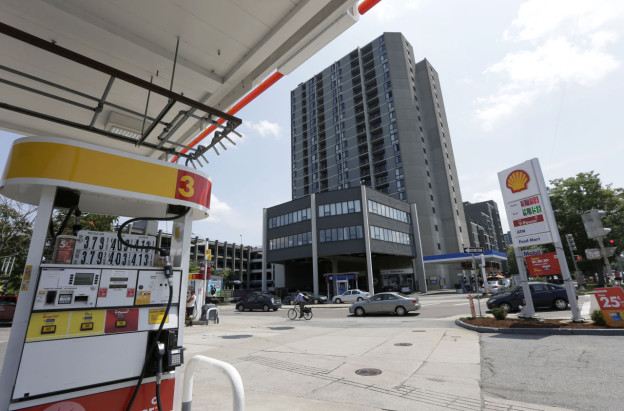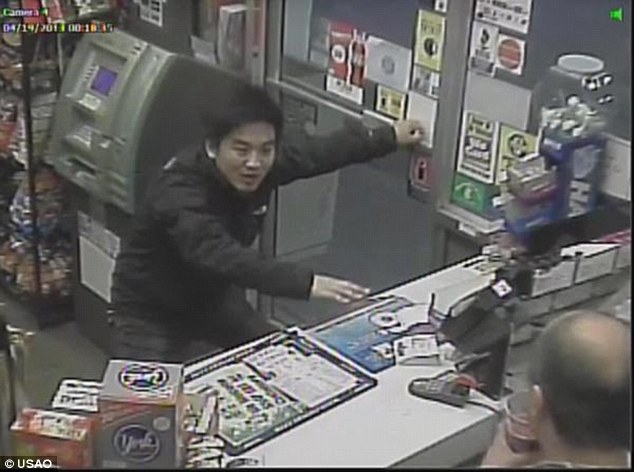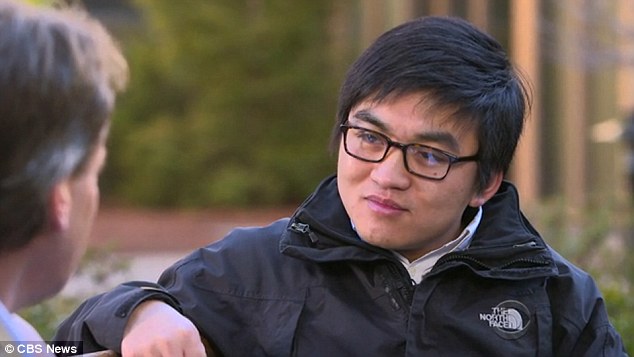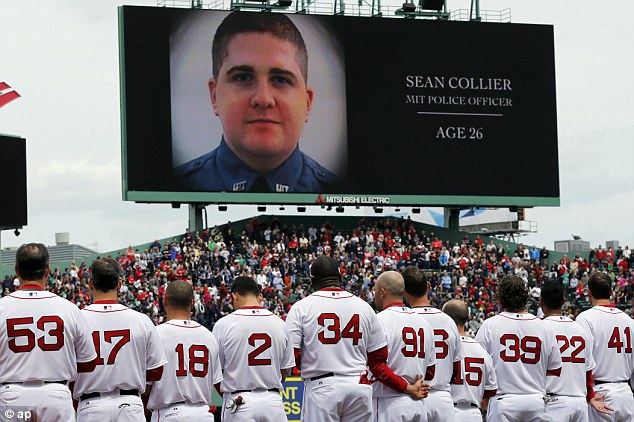ON March 12, 2015, carjacking victim Dun Meng took the stand in Federal Court to testify against Dzhokhar “Jahar” Tsarnaev in the Boston Marathon bombing trial. The soft spoken 24-year-old Chinese national presented himself honestly, as a graduate student who was living the American dream on a terror filled night in April 2013 when he was carjacked at gunpoint in the suburbs of Boston. Meng’s carjacking nightmare ended when he called the police from a Cambridge gas station, a tip that would lead to the capture of the accused Marathon bombers. His testimony at trial would help convince the jury to convict Jahar on related charges, sentencing him to death in June 2015.
Meng is (for good reason) a very difficult man to reach these days. This reporter was unable to ascertain where Meng was on April 15, 2013 or in the days that followed because previous reporters do not appear to have asked him this question, and neither the prosecution nor the defense asked him to testify on the subject of his whereabouts while he was on the stand. However, newly uncovered documents show that Meng and his business partner may have dodged several gruesome crime scenes left in the wake of the bombing, and were likely to cross paths with the Tsarnaev’s long before they carjacked Meng.
FROM GRADUATE STUDENT TO BUDDING ENTREPRENEUR
During opening statements at trial, defense attorneys for then 20-year-old Jahar Tsarnaev admitted that on April 15, 2013, Jahar helped his brother Tamerlan, 26, planted bombs at the Boston Marathon. The explosions on Boylston Street killed three and wounded up to 260 others. Jahar’s attorneys also admitted that three days later, their client and his brother participated in the murder of MIT police officer Sean Collier, then carjacked Dun Meng.
On April 19, 2013, Meng escaped with his life at a Cambridge gas station. Less than an hour later, Tamerlan would be killed in a shoot out with police on the densely populated suburban streets of Watertown. Jahar was captured alive, only to be sentenced to death by a jury of his peers in June 2015.
When it was Meng’s turn to take the stand at Jahar’s trial, the student entrepreneur told the jury through a thick and sometimes wavering Mandarin accent that he had come to Boston from China in 2009 to obtain his master’s degree in transportation and engineering from Northeastern University. Meng testified that while he was in school, he and a business partner were working on developing and marketing a Chinese food delivery app, but that he didn’t have a the proper immigration documents which would allow him to legally work in the US.
These documents obtained from the Massachusetts Secretary of State shed new light on what Meng’s life and business plans entailed in the year leading up to the carjacking. In February 2012, Meng and his business partner Yinglin Yang registered a business called Pleashare, Inc. with the Massachusetts Secretary of State. Pleashare’s registration shows that in 2012-2013, Pleashare’s business address was located at 800 Boylston Street, and that Meng was living on Ocean Boulevard in Revere. Other documents filed with Secretary’s office during that same year show that Yang was also the proprietor of another business called Upgrade Journey, which had offices in Chelsea and Woburn. Upgrade Journey’s documents show that Yang’s apartment was located at 812 Memorial Drive in Cambridge.
According to U.S. Immigration authorities, Pleashare, Inc. is a “planning and transportation leader” founded at some time in or before 2011. Pleashare has sponsored one person’s visa, and that person’s salary was $75,000, but does not list what the source of Pleashare’s funding. Immigration authorities have also listed Pleashare’s address as being at 185 Squire Road in Revere.
During trial testimony, Meng said that in the early months of 2013, he returned to China while he waited for the U.S. government to grant him the H1B visa he needed work legally in the U.S. Meng told jurors he obtained his visa in early spring and returned to Boston, but he didn’t have much income because his startup hadn’t yet launched.
Nonetheless, trial exhibit 754 shows that in March 2013, Meng put $17,000 in cash down on a the lease a new Mercedes SUV. The agreement with Mercedes-Benz of Boston required Meng to make additional monthly payments in the amount of $652.10, but does not state what the source of Meng’s payments were.
Another interesting fact about the car lease was that according to reporters present at the trial during Meng’s testimony, the lease document presented in court listed Meng’s address as 350 Third Street in Cambridge. However, this information was redacted from the document released to the public on the DOJ’s website. According to documents filed with the Secretary of State in late June 2013, 350 Third Street was also the business address for Upgrade Journey, and by then one of Upgrade Journey’s business partners had moved to Houston, Texas.
The immigration information is interesting because Meng was here on a student visa when founded his company, but that visa did not allow Meng to work. Pleashare sponsored one U.S. visa application in 2011, listing that employee’s salary at $75,000. However, Pleashare was not registered to do business in the State of Massachusetts until 2012, and Meng did not receive an H1B visa until 2013. It is not known why Pleashare provided different business addresses to immigration authorities and the Massachusetts Secretary of State, or whether this would be significant to the sponsored employee’s immigration status.
Although the source of Pleashare’s funding and the $17,000 Meng used as a cash downpayment of his car lease remain unknown, his large car expenses may account for the fact that Meng only had $1,516.57 in his bank account on the night he was carjacked (see trial exhibit 768 and 769.) What became the bomber’s “burner car” might have been doomed to be repossessed if Meng could not continue making payments that spring, yet Meng’s lack of cash on the night of the carjacking begs the question of what Meng’s captors might have done if he had been able to give them more cash?
A DEADLY WEEK ENDS IN CARJACKING
On April 15, 2013, two bombs exploded on Boylston Street. At trial Jahar admitted he planted one of these bombs at 755 Boylston Street, about a block over and across the street from Pleashare’s 800 Boylston Street address. 8-year-old Martin Richard and Lingzhi Lu, 23, a Chinese graduate student at Boston University were killed in the explosion. But the FBI says that they did know the identities of the bombers until Meng’s carjacking report helped locate the suspects.
According to news reports, Abdulrahman Ali Alharbi, 21, a Saudi Arabian student was injured by the same bomb detonated across the street from Pleashare. The following day, the FBI raided Alharbi’s apartment in Revere, which was located in the building next to Meng’s apartment. Homeland Security Secretary Janet Napalitano later said that although Alharbi was never a suspect in the bombings, authorities placed him briefly on the “no fly” list while they cleared his name.
There is no evidence to suggest that Alharbi was involved in the bombings or that he knew Meng, it is just another extraordinary coincidence that befell Meng that fateful week.
Meng told jurors that on April 18th, he was working late at his Kendall Square office in Cambridge, which is located on the MIT campus. At approximately 5:00 p.m. that evening, the FBI released photographs of two men matching the description of the Tsarnaev brothers who were wanted for questioning in the Marathon bombing case.
“After day of work, I — after like about 10:30 I finished the discussion with my partner. So I left my workplace,” Meng testified. “I feel a little tired, so I decided to drive with my car out to get a ride to relax.”
Although Meng said he was headed no place in particular, he noticed some unusual police activity as he left work that night.
“When I was on Memorial Drive near the MIT campus, I saw a lot of police cars with blue lights drive into the MIT campus. It’s about a five or six, maybe more than that, police cars. So I thought that maybe something happened there, but I don’t know what happened.“
Meng may have just missed crossing paths with another disaster. At around the same time Meng was leaving work, the Cambridge Police received a call about shots fired on the MIT campus. At around 10:30 p.m., authorities discovered MIT police officer Sean Collier shot to death in his cruiser outside the Stata Center, just blocks from Meng’s Third Street office in Kendall Square.
This MDAO press release explains what Cambridge Police believed happened to Meng next:
“A short time later, police received reports of an armed carjacking by two males in the area of Third Street in Cambridge. The victim was carjacked at gunpoint by two males and was kept in the car with the suspects for approximately a half hour. The victim was released at a gas station on Memorial Drive in Cambridge. He was not injured.”
What the press release does not say is that Meng escaped from his own car [the front seat?] at the Shell station, then ran across the street and called police from a Mobil convenience store located at 812 Memorial Drive in Cambridge. Upgrade Journey’s documents show that at the time, Meng’s business partner may have lived in the same apartment building above the Mobile station where Jahar’s friends also resided.

Surveillance footage released by the DOJ:
Nonetheless, at trial, Meng offered up a different story that was much more terrifying than what the MDAO and even the FBI initially suggested. None of the timelines surrounding the car jacking seem to add up.
Meng testified that at some time prior to 11:00 p.m., Tamerlan carjacked him at gun point as he sat parked in his Mercedes at 60 Brighton Avenue in Allston (which is different than the Cambridge location given by MDAO.) Meng said that Tamerlan subsequently confessed to carrying out both the Marathon bombing and Officer Collier’s murder.
According to Meng, Jahar joined them later on, and that they spent 90 minutes driving around the unfamiliar streets of Cambridge, Waltham and Watertown trying to empty Meng’s bank accounts. Meng’s nightmare ended just after midnight on April 19, 2013 when he managed to escape after his captors became distracted at a Cambridge gas station.
“This was the most terrifying moment, the most difficult decision in my life,” Meng said. “I dashed onto the street. I could feel he was trying to grab me.”
Although Meng may have known that his business partner lived upstairs, he probably would have hidden somewhere else had he known that Stephen Silva, the man who supplied Jahar with the gun used to carjack him and kill Officer Collier also lived in the same building.
Other notable residents of 812 Memorial Drive at that time included Robel Philipos, a friend of Jahar’s who knew nothing about the bombings or the Tsarnaev’s crimes, but was nonetheless voraciously prosecuted by the DOJ for lying to investigators about the meaningless information he possessed before being made aware that he should seek counsel. In 2015, a jury found Philipos guilty on those charges, and he is currently appealing his conviction and three year sentence in the case.
After the Tsarnaev’s left the Memorial drive gas station, the Cambridge police were able to use information from Meng to track down the suspects :
“Police immediately began a search for the vehicle and were in pursuit of the vehicle into Watertown. At that time, explosive devices were reportedly thrown from car by the suspects. The suspects and police also exchanged gunfire in the area of Dexter and Laurel streets. During this pursuit, an MBTA Police officer was seriously injured and transported to the hospital.
During the pursuit, one suspect [Tamerlan] was critically injured and transported to the hospital where he was pronounced deceased. An extensive manhunt is ongoing in the Watertown area for the second suspect, who is believed to be armed and dangerous.”
COULD LAW ENFORCEMENT HAVE PREVENTED THESE TRAGEDIES?
In the days that followed Jahar’s capture, the FBI issued a press release denying that it knew the identities of the Marathon Bombers until Tamerlan’s corpse was fingerprinted, but conceded that the Joint Terrorism Task Force swarmed the MIT campus “on an unrelated matter” in the hours leading up to Collier’s murder.
This was hardly the truth. Several members of the Tsarnaev family had been arrested by local police over the years for various misdomeanors. In fact, authorities say Tamerlan’s “radicalization” may have actually taken place in 2009-2010 while he while he was still on the pre-trial probation rolls of the Middlesex DA and facing charges for assaulting an ex-girlfriend. However, no one from the Middlesex probation office testified at trial, and none of the probation files made their way into court.
In addition, Tamerlan’s death certificate and his family’s testimony at trial revealed that his family was deeply tied to Russia. FBI Director Robert Mueller III later admitted to Congress that it was aware that Russia had been watching Tamerlan [on U.S. soil] since 2010, and that the FBI had a relationship with the Tsarnaev family dating back to at least 2011. Mueller also told congress that both the FBI and CIA had placed Tamerlan on terror watch lists at the suggestion of Russian security forces in the years leading up to the bombings.
There is no evidence to suggest that Meng knew the Tsarnaev’s or Jahar’s friends who lived in the same building as Meng’s business partner. But the coincidences surrounding Meng’s choice of addresses continue to manifest.
According to the Secretary of State, Pleashare, Inc. recently moved its’ headquarters to a communal office space on the 14th floor of One Broadway, another MIT building located just two blocks from where Officer Collier was murdered. According to their website, Meng’s office is home to dozens of other businesses, including several tech start ups and a surprising number of defense contractors. The 14th Floors most notable tenants include Global Strategies, Inc., which employed Russian spy Andrey Bezrukov until he was arrest and deported in 2010.
Meng’s addresses are significant because he is a Chinese national with many addresses, and the only known witness who was not involved with the crimes but who could have been present at so many national security terror events, such as the Boston Marathon bombing, the Revere search, the carjacking, and Watertown (before the police arrived.)
The fact that the trial failed to elicit testimony from Meng which would explain whether he was concerned that his addresses were located so close to the crime scenes suggests that prosecutors and defense attorneys either didn’t know or had deemed the information irrelevant. Alternatively, the information may have been suppressed in one of the 800 pleadings sealed at trial.
The exhibits and transcript from Dun Meng’s testimony in the Boston Marathon bombing case can be accessed here and here.
This article is the copyrighted property of the writer and The No Spin Zone. Written permission must be obtained before reprint in online or print media. REPRINTING CONTENT WITHOUT PERMISSION AND/OR PAYMENT IS THEFT AND PUNISHABLE BY LAW.






